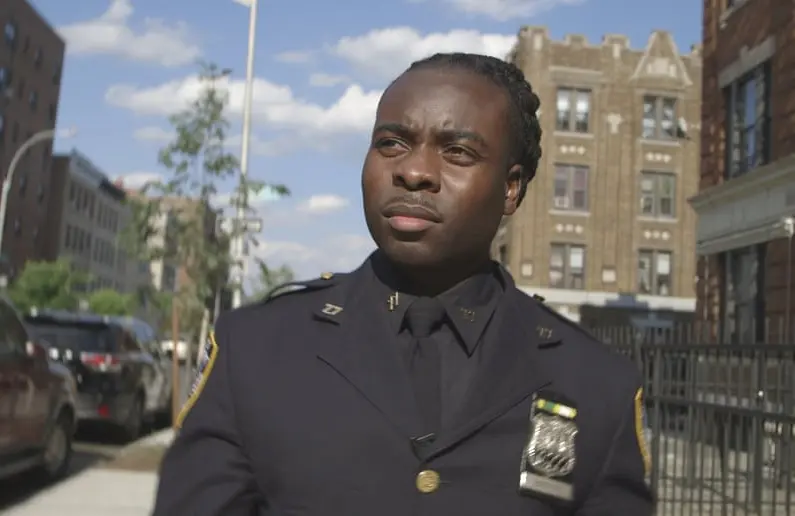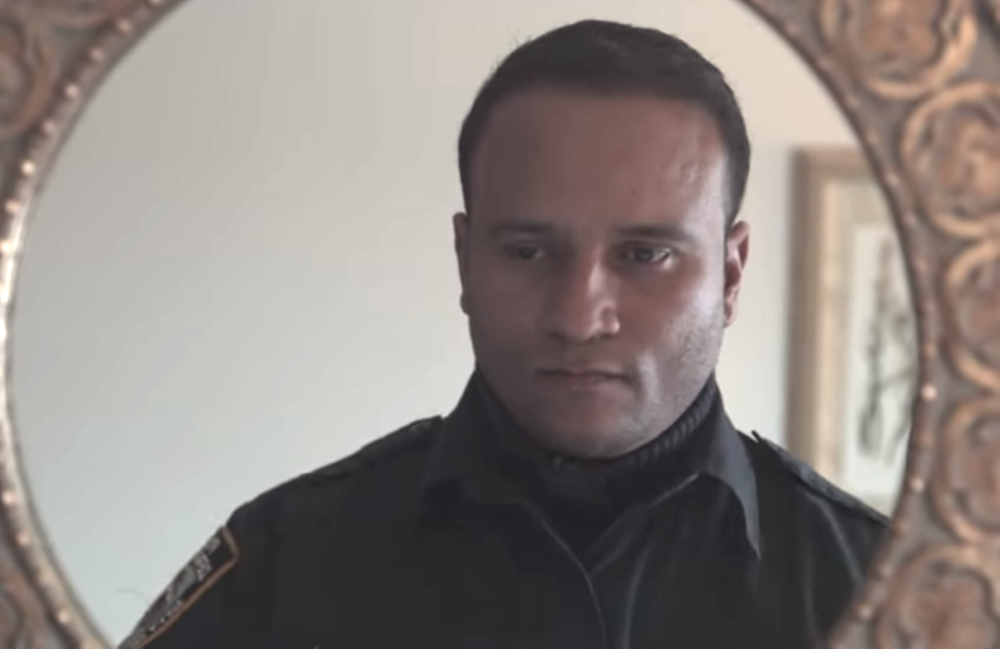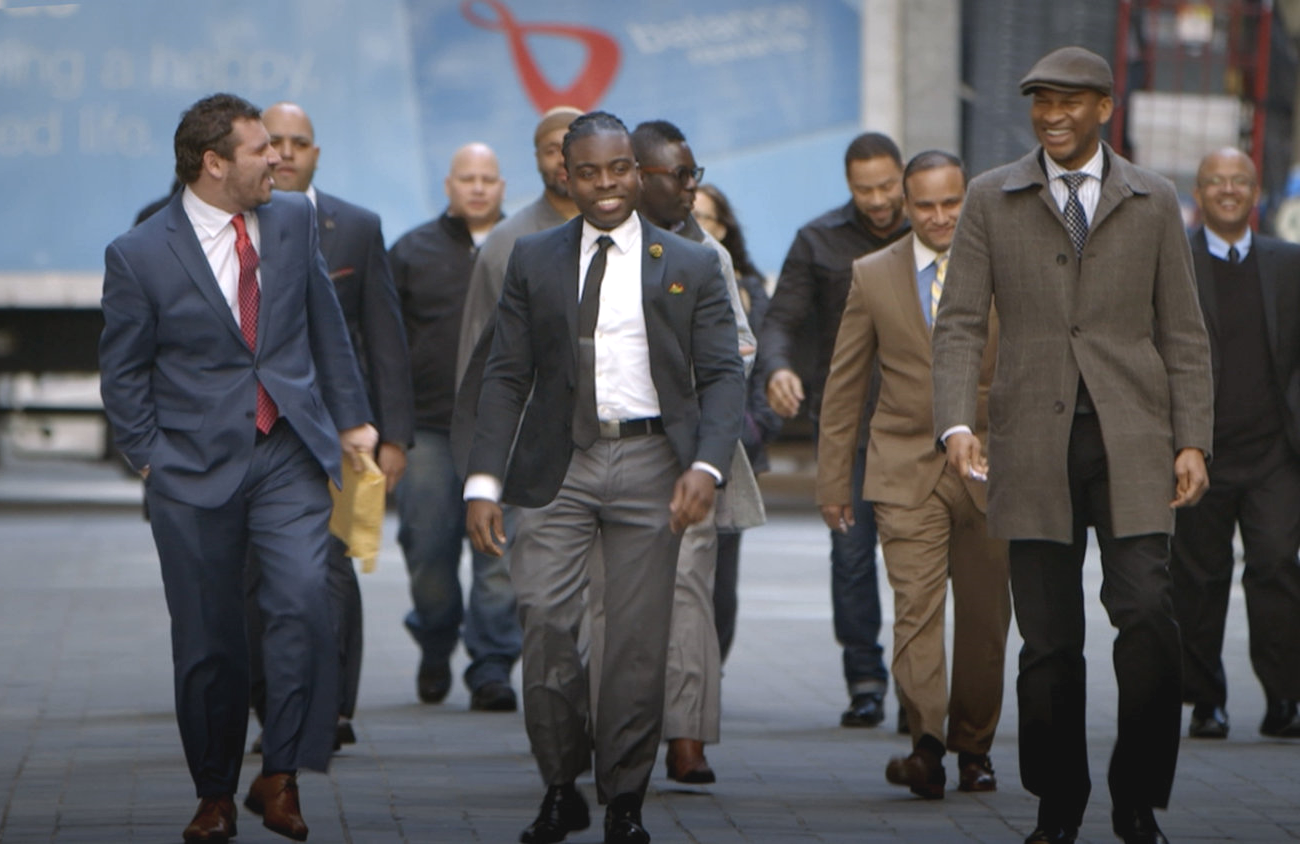'New York Is Ferguson on Steroids’: The Chilling Lesson of Crime + Punishment
-
 Officer Edwin Raymond in an image from the Hulu Original documentary Crime + Punishment
Officer Edwin Raymond in an image from the Hulu Original documentary Crime + PunishmentCrime + Punishment
112 minutes
Watch on HuluAfter the Enron Corporation imploded spectacularly in late 2001, director Alex Gibney spent three years reassembling the evidence with help from investigative reporters and former Enron insiders. The result was a compelling visual autopsy, Enron: The Smartest Guys in the Room.
Watching it again, I’m struck by how Gibney kept connecting the failure of one corporation to a larger cultural rot that was, at the time of the film’s release, still working its way through American capitalism. You had the ravenous demands of shareholders, the complete lack of regulatory oversight, the almost mystical belief in the power of visionary CEOs to solve problems and create wealth. Looking back now, all the warning signs were there of the much larger tragedy that would sweep through the financial services industry in 2007-2008.
It seems to me that director Stephen Maing, in his stunning documentary Crime + Punishment, has done something very similar. On its surface, this is a film about the failure of one institution — the NYPD, America’s largest police department with 36,000 uniformed officers — to control internal abuses that are eroding community trust in their justice system.
But Crime + Punishment raises red flags that the cultural rot eating away at the NYPD could attack any city or town in America.
The film begins with a long flyover shot of Manhattan at daybreak, gorgeous video that turns ominous as it’s overdubbed with audio of a phone call between the filmmaker and Sandy Gonzalez, an officer with the NYPD.
“They’re retaliating against me because of my numbers,” the cop tells Maing. “I would have to massively write summonses and arrest people to come up close to the number they made. … To hell with this. It’s crazy.”
Maing asks, “Sandy, can I come down there and film it?”
“All you want,” Gonzalez says.
And with that, another disillusioned New York City police officer decides a good-paying job and pension is not worth the moral cost of participating in the NYPD’s unspoken, unsavory, and ostensibly illegal quota system.

In 2010, the state of New York outlawed the practice of making cops meet quotas for stops, summonses, and arrests. Three years later, a federal judge ruled that the NYPD had violated the 14th Amendment when it “stopped and searched hundreds of thousands of minority New Yorkers in ways that violated their civil rights.”
But that didn’t stop the quota system — it just went undercover. Officer Gonzalez found this out the hard way when he attempted to ignore calls by his superiors to “hit your numbers.” Eventually he was demoted to patrol duty on a block dominated by a large parking lot.
This is where Maing comes in. Using a long lens and a hidden microphone, he captures a conversation between another officer and Gonzalez regarding the coat he’s wearing. Though it’s barely above freezing and Gonzalez has been standing on a corner, as required, for hours that day, the other cop (who’s white) issues him a citation. He says the heavy coat Gonzalez has on is only to be worn when the temperature is below 32 degrees.
“When I came out it was below 32,” Gonzalez protests, to no avail.
Maing’s hidden-camera expose adds detail to the larger story he’s telling, about the group of whistleblowers that Gonzalez is about to join in a class-action lawsuit against the city. With intimate access to their meetings, Maing chronicles the odyssey of these law enforcement outcasts, soon to be known as the NY12, as they use the media and the courts to achieve what the state legislature could not — an end to the quota system.
The NYPD’s then-superintendent, Bill Bratton, pops up in a couple of places to deny vehemently that quotas exist. Otherwise, Maing ignores the higher-ups, because his film has the goods on them.
Mostly Crime + Punishment is a film about heroes, which Maing defines as the people willing to risk personal hardship to bear witness against a system that’s abusing the public trust.
They include Pedro Hernandez, a young man who endures months in lockup at New York’s notorious Rikers Island rather than accept a plea on charges drummed up by cops trying to hit their numbers; Derick Waller, a 20-year beat cop who embodies community policing at its best and documents everything; and Felicia Whitely, who joins the NY12 while supporting two children at home and one on the way.
And then there’s Edwin Raymond, a quietly brilliant seven-year veteran of the force. Even though he scored in the top 0.1% on the sergeant’s exam, Raymond has been denied promotion two years running, and when he goes to find out why, he has the recorder on his iPhone running.

“You’re a young black man with dreads, very smart,” we hear his supervisor say. “Your words is loud.” Even more than his failure to hit his quotas, he’s told, his blackness is a problem.
The supervisor quotes the officer in charge of promotions: “Fuck this dude,” he tells Raymond. “Those were his exact words.”
Growing up in desperate poverty — “The majority of my calories came from school lunch,” he recalls — Raymond has much to lose from going public with his beefs. He may never get that promotion. But the way he sees it, “To be asked to participate in something that disenfranchises black folks even more, it’s horrible.”
And Raymond sees the larger picture: “New York City is Ferguson on steroids,” he says.
Indeed, state and local governments everywhere are increasingly reliant on revenue generated by the criminal justice system — whether a suburban police force in St. Louis or the NYPD or the vast network of private prisons across America, many of which have “occupancy quotas” baked into their contracts. When people of color are targeted to supply that revenue, it is not just an abuse of the 13th Amendment (a point Ava DuVernay makes in 13TH). It is the pursuit of short-term ends at the expense of long-term trust in institutions.
Aaron Barnhart has written about television since 1994, including 15 years as TV critic for the Kansas City Star.
TOPICS: Hulu, Crime + Punishment, Documentaries
- The Secret Lives of Mormon Wives star Mayci Neeley celebrates her first Christmas as a mom of three with husband Jacob
- Why did The Kardashians' clan pause their lavish Christmas Eve party tradition this year?
- Is M*A*S*H leaving Hulu? Reasons explored and different streaming platforms to watch this series
- Tell Me Lies season 3 trailer breakdown: Lucy and Stephan portray an eerie reunion in the upcoming mystery romance